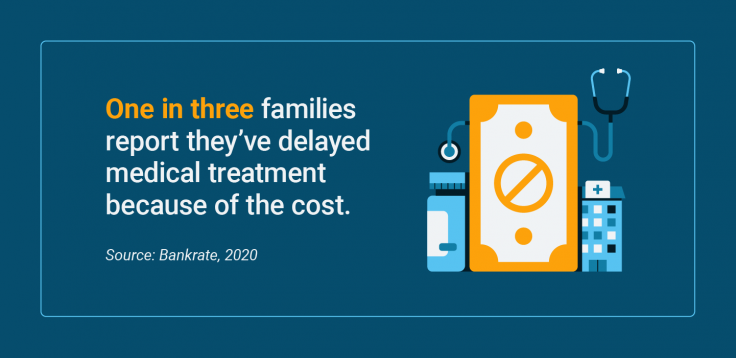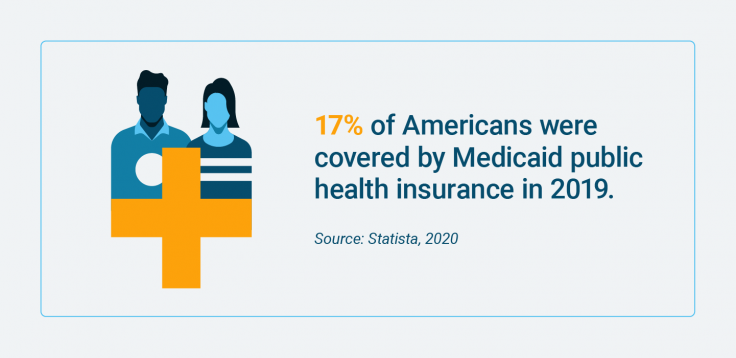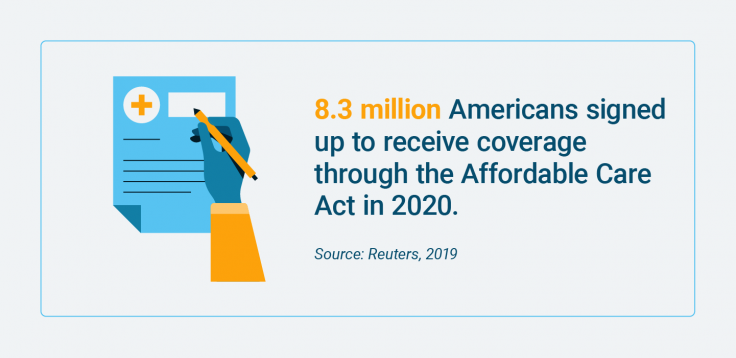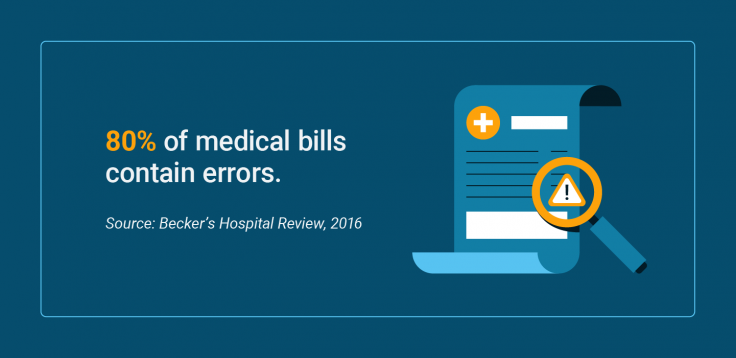
Discover financial assistance programs, insurance guidance, and veteran benefits to help cover your mesothelioma treatment expenses.
Explore Your OptionsWritten by Karen Selby | Edited by Walter Pacheco
Cancer patients aren’t immune to the strain. Medical bills present another obstacle to receiving proper care, with 63% of cancer patients and their loved ones reporting financial stress following a diagnosis.
There are financial aid programs available for those navigating treatment. These government programs and nonprofit organizations can help you pay medical bills and related medical expenses.

1. Medicare
Medicare is a federal program that provides medical insurance or assistance to seniors over the age of 65 and some younger people with disabilities. Different Medicare programs cover different types of medical needs or procedures.
Once you enroll in Medicare, you have options for which coverage you will receive. Traditional Medicare is only parts A and B. However, there are some options that include Part D.
Qualification requirements: Recipients must be 65 years of age or older. In some cases, those younger than 65 with a disability or end-stage renal disease may qualify.
Where to apply: The Social Security Administration
2. Extra Help
Extra Help is an extension of Medicare that allows people to receive extra help with their prescription drug costs that aren’t typically covered by the original Medicare plan, which only includes parts A and B.
Qualification requirements: Recipients must be low-income Medicare recipients who reside in the United States.
Where to apply: The Social Security Administration
3. Supplemental Security Income
Supplemental Security Income is a Social Security program that is funded by general funds from the U.S. Treasury. It differs from other Social Security benefits because it is not employment-based. SSI payments are paid on the first of the month to qualified recipients. In some, but not all states, SSI recipients will also receive Medicaid to help with medical bills.
Qualification requirements: Recipients must be disabled, blind or over 65 years of age, with limited access to income. They must also be U.S. citizens or legal residents, reside in the United States and not be absent from the United States for a full calendar month.
Where to apply: The Social Security Administration

Discover financial assistance programs, insurance guidance, and veteran benefits to help cover your mesothelioma treatment expenses.
Explore Your Options4. Health Insurance Marketplace
The Affordable Care Act, commonly known as Obamacare, provides access to health insurance for those who have previously gone without, including those who can’t access insurance through employment. The Health Insurance Marketplace allows you to view your Affordable Care Act options and enroll in insurance coverage if you wish.
Qualification requirements: Applicants must not be incarcerated, must live in the United States and be U.S. citizens.
Where to apply: The Health Insurance Marketplace
5. Medicaid
Medicaid is a government program that provides health care coverage to low-income people. It is the largest insurance provider in the United States, providing assistance to more than 70 million Americans.
Qualification requirements: Eligibility requirements vary by state and depend on age, income, household size and disability.
Where to apply: Through your state agency
6. Children’s Health Insurance Program
The Children’s Health Insurance Program, or CHIP, provides low-cost medical help to families who do not meet the requirements for Medicaid but cannot afford private insurance. The program is aligned with Medicaid and helps families with children cover the cost of medical needs.
Qualification requirements: Each state has different Medicaid and CHIP requirements.
Where to apply: Through your state’s Medicaid program

There are some groups that federal law mandates must be covered by Medicaid, including low-income families, qualified pregnant women and children, and those receiving SSI. However, some states provide additional coverage to other groups based on several factors.
All states require those receiving Medicaid to be low-income, live in the state they’re applying through and be a U.S. citizen or permanent resident. In addition, recipients usually must meet one of the following requirements:
Alabama, Alaska, Colorado, Connecticut, Delaware, District of Columbia, Florida, Georgia, Hawaii, Idaho, Illinois, Kansas, Louisiana, Maine, Minnesota, Mississippi, Montana, Nebraska, Nevada, New Mexico, New York, North Carolina, Ohio, Oklahoma, Rhode Island, South Carolina, Texas, Utah, Vermont, Virginia, West Virginia, Washington, Wisconsin, Wyoming: Pregnant, responsible for a child 18 years of age or younger, blind, disabled or living with a disabled person, or 65 years of age or older.
California, North Dakota, Tennessee: Pregnant, responsible for a child 21 years of age or younger, blind, disabled or living with a disabled person, or 65 years of age or older.
Kentucky, South Dakota: Pregnant, responsible for a child 18 years of age or younger, or disabled or living with a disabled person.
Arizona, Arkansas, Iowa, Michigan, New Jersey, Oregon, Pennsylvania: Pregnant, responsible for a child 17 years of age or younger, or disabled or living with a disabled person.
From there, each state has different requirements for income level. To check income level requirements or for states not listed here, check the government benefits website.

In addition to government-sponsored and funded programs, there are a few nonprofit organizations that provide assistance with medical bills.
Operating under the slogan “when health insurance is not enough,” the HealthWell Foundation offers the underinsured access to quality care. The HealthWell Foundation provides financial assistance for prescription copays, health insurance premiums and deductibles, pediatric treatment and travel costs for medical care.
Qualification requirements: Patients must have some form of health insurance and be receiving eligible treatment in the United States for one of the foundation’s covered diseases.
Where to apply: Through their online application
The Patient Action Network (PAN) supplies underinsured people battling life-threatening, rare and chronic diseases with the funds they need to pay for their care. The network provides assistance for copays, travel costs and health insurance premiums.
Qualification requirements: Recipients must fall below the United States poverty line, have health insurance and be receiving eligible medication for a qualifying disease. They also must be receiving treatment in the United States or a U.S. territory; citizenship is not a requirement.
Where to apply: Through the PAN Foundation
Case managers working for the Patient Advocate Foundation provide no-cost services to patients, helping ease the stress and financial burden of medical diagnoses. The foundation provides copay relief and financial grants to those who meet the criteria for eligibility.
Qualification requirements: Case management services are available to people who have been diagnosed with a chronic, life-threatening or debilitating disease, or who are seeking screening services for one of these diseases. Recipients must also be U.S. citizens or permanent residents who are receiving treatment in the United States or a U.S. territory, or will be within 60 days.
Where to apply: Through the foundation’s online intake form

If you receive a medical bill you can’t afford, there are several steps you can take to ease the burden of payments.
Up to 80% of medical bills contain errors. To examine your bill for errors, look for any services that are duplicated or that you didn’t receive. Also look for anything that should have been covered by your insurance. If you spot a charge that seems inaccurate, you can dispute it with the hospital or medical provider.
When you receive a large bill, you can ask to pay it in smaller, monthly installments rather than all at once. The minimum amount you can pay per month will vary depending on your bill size and ability to pay. When you receive a large bill, it’s best to ask for a payment plan as soon as possible so you can work to resolve the debt.
If you can’t pay your bill, notify the medical provider immediately. Some hospitals or providers may have services or benefits available for low-income people that can take away some of the cost.
You can also negotiate a discount on your bill by offering to pay a large sum upfront in exchange for a reduced cost. For example, some hospitals will give you a percentage off the bill if you offer to pay the entire thing at once.
Don’t put off treatment because of financial strain — especially not when dealing with a rare and serious illness like mesothelioma. Connect with a doctor who can help you navigate your treatment plan, including payment, and take advantage of the government programs that can help.
Stay up-to-date on treatment, research, clinical trials, doctors and survivors
The information on this website is proprietary and protected. It is not a substitute for professional medical advice, diagnosis or treatment. Any unauthorized or illegal use, copying or dissemination will be prosecuted. Please read our privacy policy and terms of service for more information about our website.
This website and its content may be deemed attorney advertising. Prior results do not predict a similar outcome.
The Mesothelioma Center’s claim as the most trusted resource is based on our more than 150 5-star Google and BBB reviews. Our organization also helps more than half of all mesothelioma patients annually diagnosed.
Your web browser is no longer supported by Microsoft. Update your browser for more security, speed and compatibility.
If you are looking for mesothelioma support, please contact our Patient Advocates at (855) 404-4592
The Mesothelioma Center at Asbestos.com has provided patients and their loved ones the most updated and reliable information on mesothelioma and asbestos exposure since 2006.
Our team of Patient Advocates includes a medical doctor, a registered nurse, health services administrators, veterans, VA-accredited Claims Agents, an oncology patient navigator and hospice care expert. Their combined expertise means we help any mesothelioma patient or loved one through every step of their cancer journey.
More than 30 contributors, including mesothelioma doctors, survivors, health care professionals and other experts, have peer-reviewed our website and written unique research-driven articles to ensure you get the highest-quality medical and health information.
My family has only the highest compliment for the assistance and support that we received from The Mesothelioma Center. This is a staff of compassionate and knowledgeable individuals who respect what your family is experiencing and who go the extra mile to make an unfortunate diagnosis less stressful. Information and assistance were provided by The Mesothelioma Center at no cost to our family.LashawnMesothelioma patient’s daughter


Selby, K. (2026, February 9). 9 Government Programs and Nonprofits That Can Help with Medical Bills. Asbestos.com. Retrieved February 24, 2026, from https://www.asbestos.com/treatment/expenses/government-nonprofit-financial-assistance/
Selby, Karen. "9 Government Programs and Nonprofits That Can Help with Medical Bills." Asbestos.com, 9 Feb 2026, https://www.asbestos.com/treatment/expenses/government-nonprofit-financial-assistance/.
Selby, Karen. "9 Government Programs and Nonprofits That Can Help with Medical Bills." Asbestos.com. Last modified February 9, 2026. https://www.asbestos.com/treatment/expenses/government-nonprofit-financial-assistance/.

Karen Selby is a registered nurse and Board Certified Patient Advocate at The Mesothelioma Center with more than 30 years of experience in oncology and thoracic surgery. She worked as an operating room nurse in thoracic surgery at the University of Maryland for 6 years, assisting with surgeries such as lung transplants, pneumonectomies and pleurectomies. She later served as regional director of the tissue procurement program at the University of Florida. Karen joined The Mesothelioma Center in 2009, providing patients with personalized support and resources.
Our fact-checking process begins with a thorough review of all sources to ensure they are high quality. Then we cross-check the facts with original medical or scientific reports published by those sources, or we validate the facts with reputable news organizations, medical and scientific experts and other health experts. Each page includes all sources for full transparency.
Please read our editorial guidelines to learn more about our content creation and review process.
